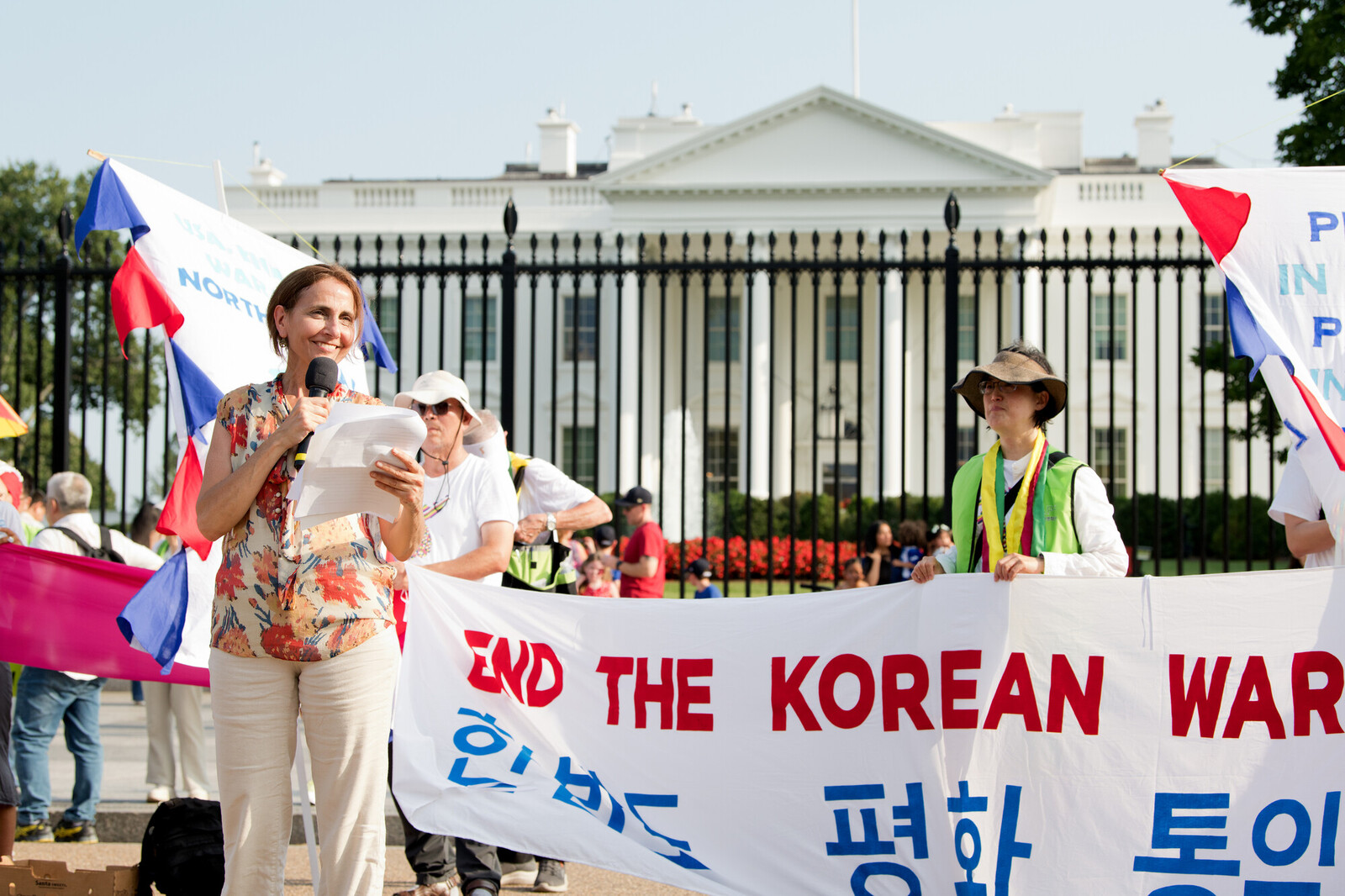
Bryan Vana / AFSC
January 29, 2025
The Honorable Donald Trump
President of the United States The White House
1600 Pennsylvania Avenue NW
Washington, DC 20500
Dear President Trump,
The undersigned coalition of national organizations write to urge you as you take office to pursue a diplomatic, peace-first approach with North Korea focused on improving relations, ending the Korean War, and reducing nuclear risk. As groups working together to establish a just peace on the Korean Peninsula through engagement, trustbuilding, peacebuilding, reconciliation, and dialogue, we hope you will dedicate urgent attention to this critical issue.
We encourage you to continue on the progress you made in your first administration toward improving relations with North Korea. Years of multiple administrations’ policies have not only failed to meet their stated goal of denuclearization, but have resulted in worsening tensions and an increased threat of war on the Korean Peninsula. We believe your administration has a unique opportunity to pursue a new approach that prioritizes peace in ways that would meaningfully advance US-North Korean relations and reduce nuclear risk where decades of pressure have failed.
In fact, there are growing voices in Congress that recognize the importance of a peace-based approach with North Korea. In the 118th Congress, the Peace on the Korean Peninsula Act (H.R. 1369), which calls for the State Department to outline a clear roadmap to peace, garnered a record 53 cosponsors on both sides of the aisle.
We strongly urge you to focus on the hard work of sustained diplomacy with North Korea and commit to the following principles:
End the Korean War. Even though active hostilities between the United States and North Korea ended in 1953 with an Armistice Agreement, there was never a formal end to the war with a peace agreement. This continued state of war is the root cause of militarism and tensions that must be resolved if there is to be real progress with North Korea. A peace agreement that ends the wartime status quo would reduce tensions and foster more effective engagement on critical issues such as improved human rights and denuclearization. Formally ending the Korean War is the foundational trust-building mechanism in achieving a durable peace and would remove North Korea's stated justification for nuclear weapons.
Agree to a gradual, reciprocal, verifiable process. The United States cannot realistically expect North Korea to unilaterally disarm before providing any sanctions relief, security guarantees, or other incentives. We urge you to reject calls to pursue a maximalist “all or nothing” approach and instead focus on actions that can move us towards advancing peace and denuclearization.
Normalize relations by building confidence and reducing tensions. There are many steps that the administration can take to shore up the potential for a successful diplomatic process. These steps include, but are not limited to:
- Reaffirming past commitments, including those most recently made in the 2018 Singapore Joint Declaration, which constructively called for new relations based on peaceful coexistence and the denuclearization of the Korean Peninsula
- Lifting the travel ban, which prevents US passport holders from entering North Korea, to facilitate people-to-people exchanges, reunions of divided families, and access for humanitarian organizations
- Expanding sanctions exemptions for humanitarian activities and access, such as the repatriation of the remains of US service members and people-to-people exchanges, as well as lifting sectoral sanctions that harm vulnerable individuals
- Suspending large-scale and live-fire military exercises, as research shows that joint military exercises do not deter North Korea but rather provoke a cycle of tit-for-tat provocative rhetoric and actions
- Establishing reciprocal liaison offices to aid in the pursuit of diplomatic talks and facilitate retrieval of U.S. Korean War servicemen’s remains and Korean-American family reunions
- Refraining from actions that constrict or complicate diplomacy, such as deploying additional missile defenses, enacting sanctions that impede talks and confidence building, employing hostile rhetoric, or rejecting leader-to-leader engagement
We urge you to take steps now to help formally end the Korean War with a peace agreement, which would lead to greater peace and security for the Korean Peninsula and the whole region. Thank you for your consideration, and we look forward to hearing from you.
Sincerely,
- Action One Korea
- American Friends Service Committee
- Blasian March
- Catholic Workers
- Coalition of Koreans in America
- Church of the Brethren, Office of Peacebuilding and Policy
- Dorothy Day House, Washington, DC
- Good Friends USA
- JTS America
- Kings Bay Plowshares
- Korea Peace Now Grassroots Network
- Korean American National Coordinating Council Inc.
- Korean American Peace Fund
- Korean American Support Association for Prisoners of Conscience Legacies of War
- Maryknoll Office for Global Concerns
- Massachusetts Peace Action
- Mennonite Central Committee U.S.
- National Association of Korean Americans
- NC Alliance for Truth and Hope
- Nevada Coalition of Empowered Korean Americans
- Nuclear Age Peace Foundation
- Peace Action
- Peace Catalyst International
- Peace Treaty Now
- Ploughshares
- Presbyterian Church (USA)
- Office of Public Witness
- Quincy Institute
- RootsAction.org
- Seattle Evergreen Coalition
- The New England Korea Peace Campaign
- The Friends Committee on National Legislation
- The United Methodist Church — General Board of Church and Society
- The United Methodist Church — General Board of Global Ministries
- The United Methodist Church — General Board of Higher Education and Ministry
- West Virginia Campaign to Ban Landmines and Cluster Bombs
- Women Cross DMZ
- Washington Butterfly for Hope
- Win Without War
- World BEYOND War
CC: National Security Advisor Mike Waltz Deputy National Security Advisor Alex Wong Secretary of State Marco Rubio